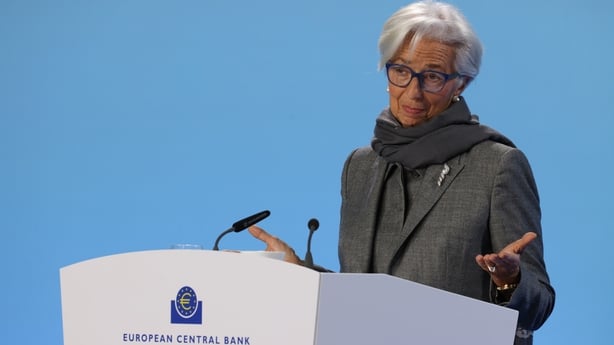The European Central Bank pushed back against bets on imminent cuts to interest rates today by reaffirming that borrowing costs would remain at record highs despite lower inflation expectations.
The euro zone's central bank left borrowing costs unchanged and did not even hint at a possible reduction.
ECB President Christine Lagarde highlighted instead that inflation would soon rebound and price pressures remain strong.
That was in stark contrast to the more dovish tone taken by her US Federal Reserve counterpart Jerome Powell last night.
"Should we lower our guard? We asked ourselves that. No - we should absolutely not lower our guard," Lagarde told a news conference after the ECB's rates decision.
"We did not discuss rate cuts at all. No discussion, no debate," said Lagarde, describing herself as "in Covid recovery mode" and speaking markedly more quietly than usual.
While acknowledging that underlying price pressures were easing, Lagarde said domestic inflation, largely driven by wage costs across the 20 countries that use the euro, was "not budging".
"We need to better understand what is happening there," Lagarde said of those wage dynamics, and to what extent any further wage gains would be absorbed by companies.

Future inflation risks for Europe ranged from geopolitical tensions that could push energy prices higher in 2024 right through to the potential for more extreme weather that could damage next year's food harvests.
The cautious tone ran against investor bets on interest rate cuts in the first half of next year, in what would be a sharp reversal from the sequence of 10 consecutive increases that ended in September.
In a smaller policy change, the ECB brought forward the end of its last surviving bond-buying scheme - a legacy of the Covid-19 pandemic.
After today's decision, the ECB's deposit rate stays at a record-high 4%. It was at a -0.5% only in July 2022.
Investor expectations before the meeting pointed to a first rate cut in the spring, possibly as soon as March, which could make the ECB the first big central bank to reverse course after a concerted effort to bring down inflation since mid-2022.
Lagarde's push-back against rate-cut bets came after it took the ECB a year and a half to steer inflation onto a convincing downward path.
We need your consent to load this rte-player contentWe use rte-player to manage extra content that can set cookies on your device and collect data about your activity. Please review their details and accept them to load the content.Manage Preferences
Her job may have been made harder by the Fed, the world's most influential central bank, which signalled last night that lower borrowing costs would come next year, with policymakers indicating up to three cuts.
After the ECB decision, traders trimmed bets on ECB rate cuts, which are now seen starting in April and totalling 140 basis points next year, compared to as much as 160 basis points earlier today.
A slim majority of economists polled by Reuters before the meeting thought the first rate cut would come by June.
The ECB's updated economic projections pointed to lower inflation and growth, particularly for next year.
ECB staff expects headline inflation to average 5.4% in 2023, 2.7% in 2024, 2.1% in 2025 and 1.9% in 2026.
Inflation in the euro zone stood at 2.4% in November although it was expected to rebound somewhat in the coming months due to some tax changes and a lower basis of comparison a year earlier.
The trouble for Lagarde and her Governing Council colleagues is that the ECB's projections have often been wide of the mark - most significantly in 2021, when the central bank failed to anticipate the surge in inflation.
The ECB also took a decision on the future of its Pandemic Emergency Purchase Programme, which it unveiled at the onset of the outbreak to stabilise markets and fight off the threat of deflation
This was due to run in full until the end of next year but, with markets now calm, the ECB said it would replace maturing bonds only through June and then phase out reinvestments in the second half of the year.

Trevor Grant, chairperson of the Association of Irish Mortgage Advisers, said while today's news will be a relief to homeowners, the ECB rate is still at a record high, and recent hikes have added to the financial stress facing many homeowners.
"With inflation falling, it does appear that ECB rate rises have peaked and the expectation is that the ECB will commence a round of interest rate reductions at some stage next year - possibly as early as late March or early April.
"However, even if the ECB starts to reduce its rates at some point in 2024, home-loan mortgage rates are highly unlikely to fall as home loan rates have not increased at the same levels as the ECB rate has, and also, because banks are under pressure to increase returns for their savers," he added.
He said this means that many Irish mortgage holders will continue to feel the pressure of today's higher interest rates for some time yet.
Mr Grant said we could see even more mortgage borrowers struggling to afford their mortgage in the coming year.
"There are an estimated 100,000 mortgage holders whose fixed rate will expire within the next 12 months and who are therefore facing a significant financial shock because they will see a substantial increase in their interest rate, and therefore their mortgage repayments, when their fixed rate mortgage term expires," he explained.
"On this basis, mortgage holders shouldn’t delay switching or looking for a better deal on their mortgage," he added.

